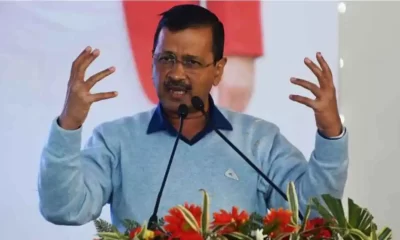Latest business news
How to Buy an iPhone with the Bajaj Finserv EMI Card
iPhones are on the wishlist of many Apple enthusiasts and gadget lovers. These smartphones, manufactured by Apple, one of the leading companies in the world, come with a wide range of cutting edge features

iPhones are on the wishlist of many Apple enthusiasts and gadget lovers. These smartphones, manufactured by Apple, one of the leading companies in the world, come with a wide range of cutting edge features. The experience of owning and using an iPhone is definitely different and unmatched.
However, as with any product that is as feature-rich and well-designed as the iPhone, the price tag on these devices can be quite a downer. If you have the latest iPhone in your cart, but the steep price is stopping you from checking out, here’s an idea. Why not buy your iPhone on EMI?
Buying an iPhone on EMI
Normally, when you make a purchase at a store or online, you will have to pay the entire price upfront. Now, in the case of an iPhone, paying the whole cost at the time of purchase can be quite challenging, because even entry level phones from Apple cost around Rs. 40,000 or more.
However, you can work around this by buying your iPhone on EMI or Equated Monthly Instalments. This means the purchase price of the iPhone will be divided into multiple EMIs across the EMI tenure you choose. You can then pay back the cost across this tenure by breaking up the lump sum payment into smaller EMIs.
For availing this service, you will have to pay an additional interest on the purchase price. But by applying for the Bajaj Finserv Card online, you can get your iPhone on no cost EMIs too, meaning that you don’t have to pay any extra charges.
How to Buy an iPhone with the Bajaj Finserv EMI Card
Buying an iPhone on EMI with the Bajaj Finserv EMI Card is fairly easy. You only need to follow the steps listed below.
Step 1: Browse the latest iPhones on the websites of our partner stores.
Step 2: Select the iPhone you wish to purchase and click on ‘Buy Now.’
Step 3: At the time of checkout, choose the Bajaj Finserv EMI Card as your preferred mode of payment and select the ‘No Cost EMI’ option.
Step 4: Choose the tenure over which you want to pay the EMIs.
Step 5: Click on ‘Submit’ and place your order.
That’s it! This is all you need to do to buy your preferred iPhone on EMI. Using the Bajaj Finserv Card online is very simple. You can also use the card to pay for your Apple smartphone on EMI at any of the physical branches of our partner stores.
Reasons to Buy iPhones on EMI with the Bajaj Finserv EMI Card
There are many advantages that come with using the Bajaj Finance Card online to buy your preferred iPhone on EMI. Here are the top benefits.
- Zero Down Payment
You can buy the best iPhones in the market on EMI even without a credit card. And you don’t even need to make a down payment on your purchase.
- High Pre-Approved Loan Limit
With the Bajaj Finserv EMI Card, you get a high pre-approved loan up to Rs. 4 lakhs. This is more than sufficient for you to get your preferred iPhone and pay for it in instalments.
- Convenient Repayment Tenures
You can choose to repay your EMIs over convenient repayment tenures ranging from 3 to 24 months.
- No Foreclosure Charges
In case you want to pay off your purchase cost before the end of the repayment tenure, you can do so without any foreclosure charges. This can be done at any time after the first EMI has been paid.
- No Added Charge on EMIs
You do not need to pay any additional interest charges on the EMIs, thanks to the no cost EMI option offered on the Bajaj Finserv EMI Card.
Conclusion
So, as you can see, it is extremely easy to buy your favourite iPhone on EMI using the Bajaj Finserv EMI Network Card. The steps listed in this article should help you make your purchase easily. Once you’ve made your purchase, remember to pay your EMIs on time, so your credit history and your credit score can benefit from your timely repayments.
Bilkis Bano case: Relatives welcome rape convicts with sweets and hugs after release | WATCH
Video of pizza dough under mop goes viral, Domino’s face Twitterati ire | WATCH
Latest business news
Google restores delisted Indian apps after government intervention
Google on Saturday restored all Indian apps it had removed.

Google has started to restore all the delisted Indian mobile apps on Play Store agian, which they had removed due to a disagreement over service fees. After a discussion between company representatives and IT Minister Ashwini Vaishnaw, the decision was made, according to sources.
The step was taken in response to Vaishnaw’s strong statement in which he said that it is not allowed for apps to be removed from the Google Play Store. The minister had said, India is very clear, our policy is very clear…our startups will get the protection that they need.
Vaishnaw continued saying that he has already given Google a call. They will be speaking with the app developers who were delisted this week. This is not acceptable. The minister said this kind of delisting cannot be permitted.
Ten Indian companies’ apps were banned by Google on Friday, causing outrage in one of its fastest-growing markets. With 94% of phones running on its Android platform, Google holds a large portion of the Indian market. Popular names like Naukri and Bharatmatrimony were on the list.
The main point of contention is Google’s in-app purchase fees, which range from 11% to 26%. Indian startups have long opposed the US tech giant’s actions, believing them to be unfair.
The founder of Bharat Matrimony, Christian Matrimony, Muslim Matrimony, and Jodii, Matrimony.com, expressed shock at the matchmaking apps’ removal from the Google Play Store.
Shaadi. Com CEO Anupam Mittal described it as a dark day for India’s internet, highlighting the possible broad effects on matchmaking services. He also called Google an evil.
While, Kuku FM Co-founder Vinod Kumar Meena in a statement had said that Google was behaving like a monopoly.
Meanwhile, Google temporarily withdrew the famous Indian payments app Paytm from the Play Store in 2020, claiming a few policy infractions. Due to this decision, the founder of the company as well as the larger startup community came together to build their own app stores and file lawsuits against Google.
Latest business news
Anant Ambani says he is 100% lucky to get Radhika Merchant in his life
Anant Ambani said he was grateful to get Radhika as his life partner. He said he is 100% lucky to get Radhika Merchant in his life. He said every day he is falling more and more in love with her. He added although he had known Radhika for the last 7 years, it felt he had met her only yesterday. He thanked Radhika for everything.

Anant Ambani and Radhika Merchant’s grand three-day wedding celebrations began with a glamorous cocktail night on Friday in Jamnagar. During the celebrations, Anant Ambani also gave a speech wherein he thanked his late grandfather Dhirubhai Ambani and grandmother Kokilaben Ambani for inspiring him. Anant Ambani said he was grateful to get Radhika as his life partner. He said he is 100% lucky to get Radhika Merchant in his life. He said every day he is falling more and more in love with her.
He expressed his gratitude to his mother for pulling together the lavish three-day wedding celebrations in Jamnagar. Anant thanked his mother for all she had done. He said all the arrangements had been done by his mother and nobody else. He added his mother had gone all out and she had worked 18-19 hours a day and he was extremely grateful to her.
He also thanked all the guests who were present there at the pre-wedding celebrations. He said everyone had made it to Jamnagar to make him and Radhika feel special. He said both of them were honored and humbled to have all of them present there. Anant said he was sorry if they had caused an inconvenience to anyone. He asked for forgiveness. He hoped everyone is going to enjoy the coming three days. He also thanked his mother, father, sister, brother, his sister-law and his brother in-law for making this event memorable.
Anant said everyone has been sleeping for less than 3 hours a day for the last 2-3 months and he was very happy to share this joy with everyone. The youngest Ambani talked about his personal struggles and how his parents had always supported him. He further added his life had not been entirely a bed of roses. He said he had also experienced the pain of thorns. He said he had faced many health crises.
Latest business news
Facebook chief Mark Zuckerberg shares pictures from 2nd day of Anant Ambani and Radhika Merchant pre-wedding celebrations
Zuckerberg shared pictures from the 2nd day of Anant Ambani and Radhika Merchant’s pre-wedding celebrations. In the photograph Mark Zuckerberg can be seen along with his wife Priscilla Chan. The couple is exuding happiness as they prepare for the event. He captioned the picture it is getting wild out here.

Facebook boss Mark Zuckerberg and wife Priscilla Chan joined the star- studded pre-wedding celebrations of Anant Ambani and Radhika Merchant in Jamnagar on Friday. The event was attended by many prominent figures from different fields. Zuckerberg took to his Instagram handle congratulated the couple and said he loved Indian weddings.
Zuckerberg shared pictures from the 2nd day of Anant Ambani and Radhika Merchant’s pre-wedding celebrations. In the photograph Mark Zuckerberg can be seen along with his wife Priscilla Chan. The couple is exuding happiness as they prepare for the event. He captioned the picture it is getting wild out here.
The theme of the opening day of the pre-wedding celebrations was Evening in Everland as the guests wore cocktail attire. The first day of the grand celebrations elevated the expectations of the guests for the following days. The theme of the 2nd day of the pre-wedding bash is known as a Walk on the Wildside and the guests can be seen in Jungle Fever attire.
Zuckerberg has opted for an animal print shirt with white trousers, Chan is complementing his look in a strappy one piece in black and golden. The Jungle theme is aligned to Vantara, Reliance’s animal welfare initiative undertaken and launched by Anant Ambani a few days back.
International pop star Rihana electrified the pre wedding celebrations on Friday with an amazing performance, marking her debut appearance in India. The chart topping artist engaged the audience with performances of her iconic hits which included Pour it Up, Work and Diamonds.
Zuckerberg graced the opening day, wearing a black-on-black firefly blazer and shoes from Alexander McQueen while his wife Priscilla wore a black gown with gold flower details and other accessories such as dainty chain bracelet, gold necklace and stud earrings. Mark Zuckerberg and wife Priscilla Chan are one of the Power couples invited from the global business community for the festivities currently underway at Jamnagar.
-

 Entertainment15 hours ago
Entertainment15 hours agoBollywood stars Vidya Balan, Kartik Aaryan, Pratik Gandhi, Ileana D’Cruz, Mouni Roy, Radhika Madan, Mrunal Thakur attend Do Aur Do Pyaar premiere
-

 LATEST SPORTS NEWS20 hours ago
LATEST SPORTS NEWS20 hours agoIPL 2024: Delhi Capitals thrash Gujarat Titans by 6 wickets
-

 Cricket news14 hours ago
Cricket news14 hours agoHappy Birthday KL Rahul: Suniel Shetty wishes son-in-law KL Rahul on his 32nd birthday
-

 India News17 hours ago
India News17 hours agoReligious outfit vandalises The Blessed Mother Teresa High School in Telangana after teachers object to students wearing Hanuman Deeksha dress
-

 India News18 hours ago
India News18 hours agoClashes erupt during Ram Navami procession in West Bengal’s Murshidabad district
-

 India News12 hours ago
India News12 hours agoEnforcement Directorate seizes Shilpa Shetty’s husband Raj Kundra’s properties worth Rs 97 crore
-

 India News11 hours ago
India News11 hours agoEnforcement Directorate says Arvind Kejriwal is deliberately eating mangoes, sweets, taking sugar with tea to increase his blood sugar level and create ground for bail














